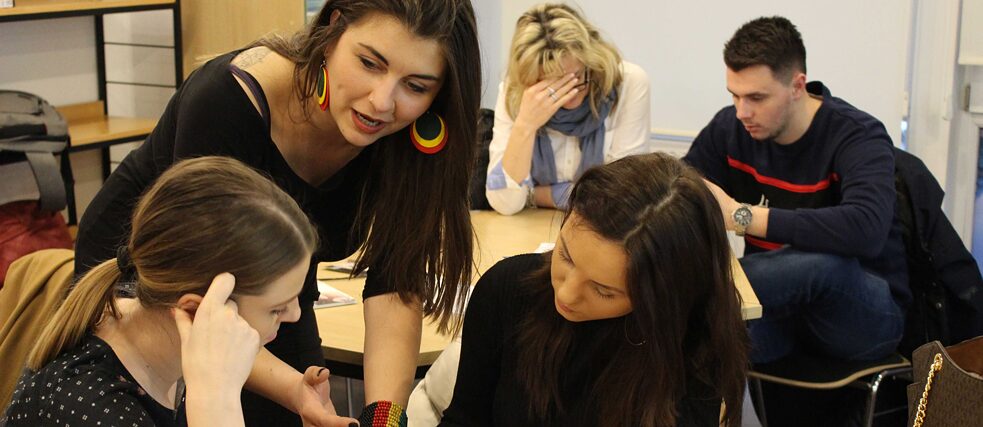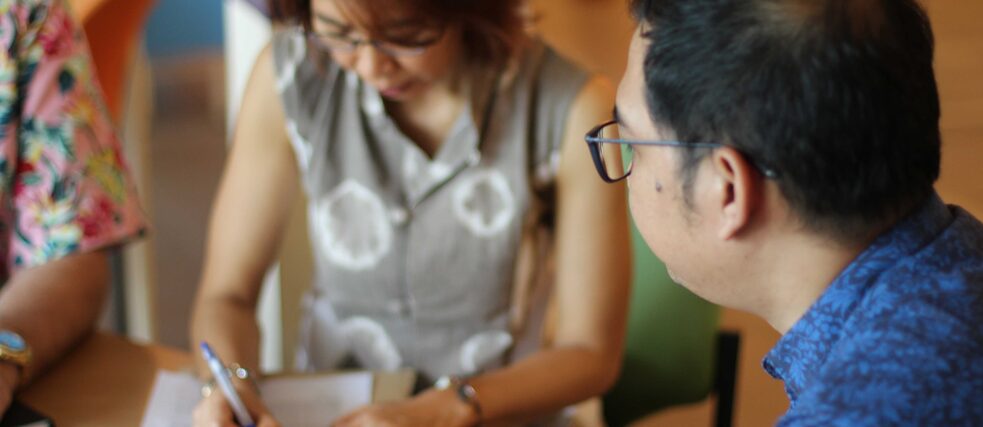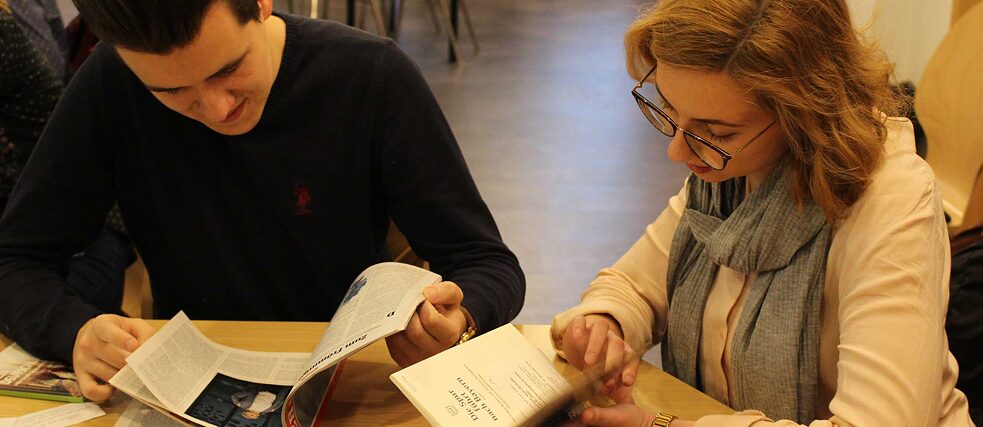Supporting migration: hand in hand, across borders

After running for two years, the project “Pre-Integration in the Regions of South-East Asia and South-East Europe” came to a close in June 2020. It should soon be possible for migrants from all over the world to use the materials generated.
By Janna Degener-Storr
When Isna, an Indonesian woman, first met this likeable businessman from Germany, she knew immediately that she wanted to spend her life with him. She approached the Goethe-Institut in Jakarta for a language course – and found out from an advisor there what steps she needed to take to marry, obtain a visa and attend an integration course.
Goran would like to live in Germany too. The IT specialist from Serbia is married to a woman from his own country and he wants a good life for his children. But at home his earnings – in relation to the cost of living – are low. Many of his friends have already emigrated for that reason. Now he too has found a job with a German company and applied for a visa. He was strengthened in his resolve at an information event held by the Goethe-Institut in Belgrade.
Preparing migrants for life in Germany
People like Isna or Goran, who would like to start preparing for life in Germany while they are still in their home countries, can find support at their local Goethe-Institut. The institution has played an active role in the field of pre-integration, as it’s known, since 2007. As of 2013 there has been a focus on migrant workers in addition to joining spouses.Whilst this work was concentrated on locations in South-East Asia from 2014 to 2017, advice sessions, seminars and information events have also been held in the region of South-East Europe over the past two years.
Improving the services
The “past masters” of pre-integration work used the project to improve the services they offer. “As well as advice, informative events and special seminars for instance to practise speaking (‘Training Sprechen’), some centres organised workshops on subjects like learning to learn (‘Lernen lernen’) and preparing for exams (‘Prüfungsvorbereitung’),” says Sombatua Sihotang, regional coordinator in South-East Asia. And Huong Thanh Nguyen from the Goethe-Institut Hanoi reports that one single alumni talk she organised in Hanoi was attended by about 120 interested people: “At this event, Vietnamese citizens who have already been living in Germany for a few years shared details of their intercultural experiences. People who are planning their departure benefit from these stories.”The Goethe-Institut Istanbul, which was already involved in the field of pre-integration in 2014 and prepares many migrants joining a spouse for life in Germany, has also intensified its work during the project period. Employee Gülseren Güleryüz tells us: “Many of our candidates come to us because they need the A1 exam for their visa. They are focused on their love for one individual, but then they realise here at the Goethe-Institut that they’re also going to love life in their new home country. They lose their reservations and begin to look forward to emigrating. And they also make friendships here, which they can continue in Germany.”
Learning from each other
The new pre-integration project centres particularly benefited from interaction with “experienced” migrants. Dr. Nemanja Vlajkovic of the Goethe-Institut Belgrade, which also oversees the pre-integration work carried out in Montenegro, explains: “As teachers, trainers and authors of learning content, we didn’t realise at the start of the project exactly what we would have to deal with in the advice sessions. It was fascinating to see how we were able to develop our work in this area a step at a time.”“Mein Deutschlandheft” – mini companion booklet for immigrants
The Goethe-Institut offices in Belgrade and Sarajevo collaborated with the Goethe-Institut Istanbul, the regional institute in Athens and the head office in Munich to develop the information and learning resource “Mein Deutschlandheft”, which is also handed out to anyone interested as a free mini-guide at centres in South-East Asia and soon in many other parts of the world. The booklet contains information on various topics, from how to re-register your driver’s licence to what to do in an emergency. The resource also includes tips for day-to-day life in Germany, and some helpful links.
The crisis and its consequences
The corona pandemic and associated institute closures mean that members of the project team are facing huge challenges.So collaborators in South-East Europe worked with the team from head office to develop the online course “Mein Deutschlandkurs”, which was based on the Deutschlandheft booklet and is also equally suitable for both independent learning and use in seminars, earlier than planned.
Development of online formats
During lockdown, a wide range of pre-integration services that should have been delivered in a classroom setting were quickly switched to online formats.
The advice, seminar and information services were also held online while the institutes at the different locations were closed. This even gave rise to new formats, such as advice via Instagram Live. “Colleagues reacted very fast and did some great work,” stressed Irina Ottow, who is involved in the project in her capacity as pre-integration coordinator at the Goethe-Institut head office in Munich.
New target groups thanks to virtual services
With these online services, the Goethe-Institut centres are also accessible to potential students from more remote cities and rural regions, who would not have been able to take up classroom-based opportunities because they would have had to travel too far. And in some cases the project collaborators even managed to win over participants who had previously only used the internet for social networks or news – for example by means of strategically placed announcements and easy-to-understand step-by-step guides in video format. “Our clientele mainly uses Facebook, Instagram and WhatsApp. Attending online seminars was unthinkable for many of our students before corona. It was very exciting for us to experience the removal of these barriers, and to find that students have accepted the new formats,” says Gülseren Güleryüz.She has found this period to be a very emotional experience: “When we hold events on the internet, we might not see the students’ faces, but we sense them. And when we ask them to turn their cameras on, they’re wearing their hearts on their sleeves. The thing is, they’re unconditional about wanting to come to Germany, and we don’t leave them in the lurch with this desire. We support them with our knowledge and provide them with motivation, so that the integration is already beginning in their heads first.”
The importance of pre-integration: documented and recognised
The high importance of pre-integration work is shown not only by the individual experiences of project collaborators like Gülseren Güleryüz or individual students like Isna or Goran. A survey of around 1000 participants who migrated to Germany for financial gain, as well as eleven experts with academic backgrounds and industry experience, have come to the conclusion that pre-integration measures make arrival in Germany significantly easier – an effect that’s more evident the greater the cultural differences are between the country of origin and Germany. The analysis “Annäherung, die im Heimatland beginnt” (approaches that begin at home) was conducted within the scope of the project “Pre-Integration in the Regions of South-East Asia and South-East Europe”. It also illustrates that many migrants underestimate the importance of preparation before arriving in Germany.
The study attracted attention from politicians. In March 2020, it was submitted to Angela Merkel by the President of the Goethe-Institut, Klaus-Dieter Lehmann, at the integration summit. In the German government’s National Plan of Action for Integration, which the Chancellor was presenting at the conference, the pre-integration work done by the Goethe-Institut was commended as well. The extension of current projects by the Goethe-Institut was termed a key undertaking and the web portal “Mein Weg nach Deutschland”, which was created in one of the previous projects, is now available in 30 languages and receives around 700 000 hits on average per year, was quoted as a Best Practice example.
Looking towards the future
In June 2020 the project “Pre-Integration in the Regions of South-East Asia and South-East Europe” came to a close. An application for the follow-on project has been submitted to the European Union Asylum, Migration and Integration Fund, to run over a period of two years.As recommended in the study, the pre-integration project is to be extended to include the regions of North Africa / Near East and South America. Furthermore, elements of the pre-integration work are to be rolled out worldwide where possible, even outside the confines of the proposed project.
Funded by:



